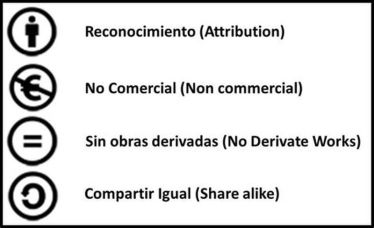Author: Águeda Delgado-Ponce – Translation: Erika-Lucia Gonzalez-Carrion
When we talk about Creative Commons (CC) we refer to free licenses that offer everyone, from the individual creator to large companies as well as institutions, in a simple and standardized way, the possibility of granting certain permissions to the public to share and use their work. In this sense, Creative Commons licenses are directly related to the open access movement, facilitating free access without subjecting the author’s rights while benefiting the advancement of science.
However, to adapt to the particular needs of each user or licensee, they offer six different licenses, although all grant two basic rights: the right to reproduce the work and to distribute the work without charge. The terms of these licenses depend on four conditions:

In this way, the following combinations are established:
![]() CC BY Attribution: This license allows others to distribute, mix, adjust and build from their work, even with commercial purposes, provided that the authorship of the original creation is recognized.
CC BY Attribution: This license allows others to distribute, mix, adjust and build from their work, even with commercial purposes, provided that the authorship of the original creation is recognized.
![]() CC BY-SA Attribution-Share-Alike: This license allows others to remix, modify and develop their work even for commercial purposes, as long as they attribute the credit and license their new works under the same terms.
CC BY-SA Attribution-Share-Alike: This license allows others to remix, modify and develop their work even for commercial purposes, as long as they attribute the credit and license their new works under the same terms.
![]() CC BY-ND Attribution-No-Derivatives Work: This license allows redistribution, commercial and non-commercial, as long as the work is not modified and transmitted in its entirety, recognizing its authorship.
CC BY-ND Attribution-No-Derivatives Work: This license allows redistribution, commercial and non-commercial, as long as the work is not modified and transmitted in its entirety, recognizing its authorship.
![]() CC BY-NC Attribution-Non-Commercial: This license allows others to intermingle, adjust and build from their work with non-commercial purposes, and although in their new creations they must recognize their authorship and can not be used commercially, they do not have to be under a license with the same terms.
CC BY-NC Attribution-Non-Commercial: This license allows others to intermingle, adjust and build from their work with non-commercial purposes, and although in their new creations they must recognize their authorship and can not be used commercially, they do not have to be under a license with the same terms.
![]() CC BY-NC-SA Attribution-NonCommercial-ShareAlike: This license allows others to intermingle, adjust and build from their work with non-commercial purposes, as long as they recognize their authorship and their new creations are under a license with the same terms.
CC BY-NC-SA Attribution-NonCommercial-ShareAlike: This license allows others to intermingle, adjust and build from their work with non-commercial purposes, as long as they recognize their authorship and their new creations are under a license with the same terms.
![]() CC BY-NC-ND Attribution-NonCommercial-No DerivativeWork: This license is the most restrictive of the six main licenses, it only allows others to download the works and share them with other people, provided that their authorship is acknowledged, but they can not be changed in any way, nor can they be used commercially.
CC BY-NC-ND Attribution-NonCommercial-No DerivativeWork: This license is the most restrictive of the six main licenses, it only allows others to download the works and share them with other people, provided that their authorship is acknowledged, but they can not be changed in any way, nor can they be used commercially.
To make science more accessible without suppressing rights, top-level publications that are open access, such as Comunicar, publish under these licenses, specifically CC BY-NC allowing its use without commercial purposes, favoring reuse and self-archiving of your articles in databases, repositories, directories and international information systems.
